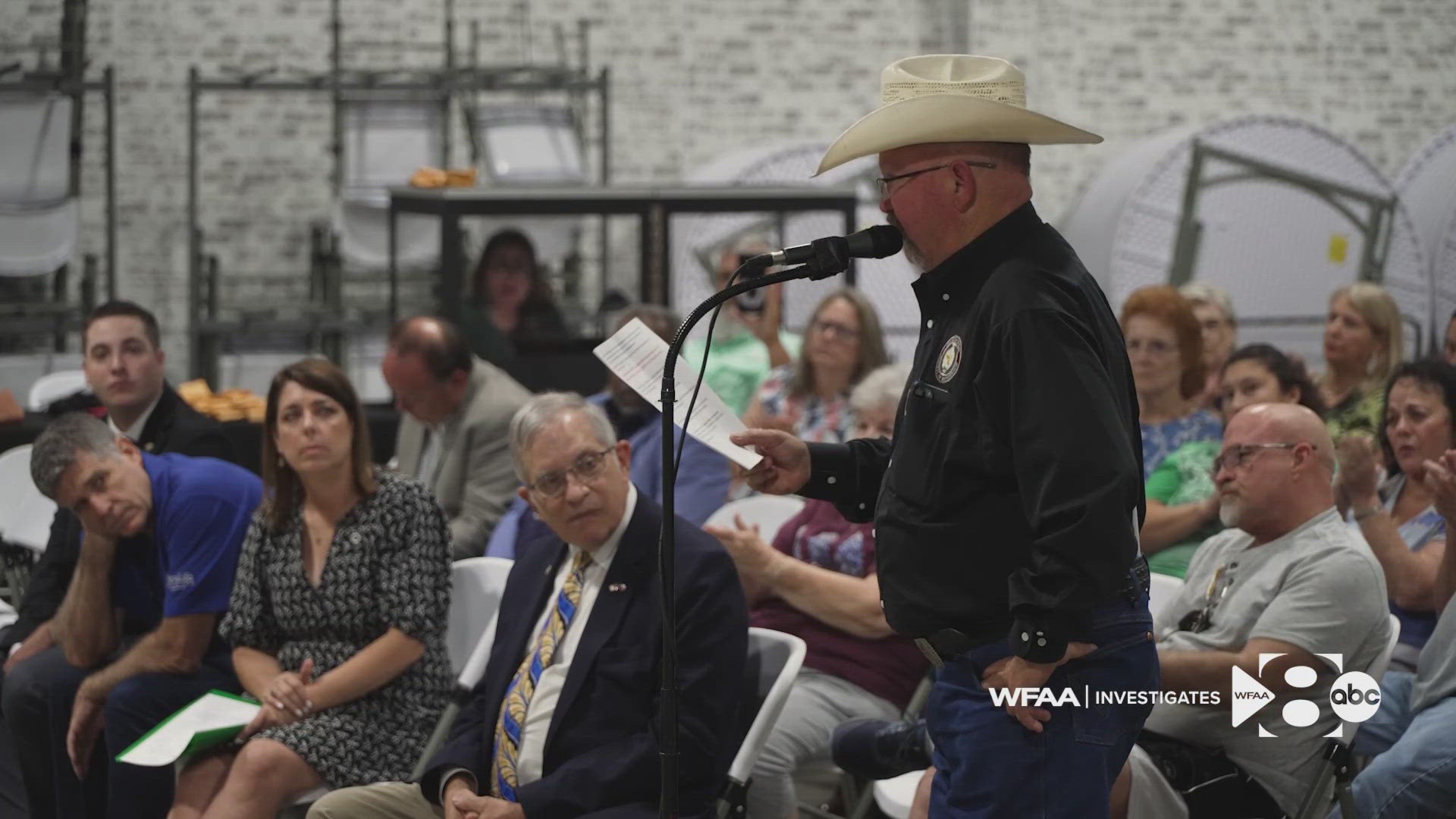VAN ZANDT COUNTY, Texas — Ranchers and farmers are fighting to stop what is about to happen on a piece of land in Van Zandt County.
At a recent public meeting, residents let their voices be heard.
“How would you feel if this was in your backyard?” said Wendy Spivey, Henderson County commissioner.
The owner of more than 200 acres has filed for a permit from the Texas Commission on Environmental Quality to spread biosolids, also called sewage sludge, on his land. It’s a fertilizer made from human waste that comes from wastewater treatment plants.
“This chemical is toxic,” said Scott Tuley, Henderson County Commissioner
As WFAA has previously reported biosolids can contain high levels of chemicals called PFAS, or “forever chemicals.” Scientists say they can be carcinogenic.
In Johnson County ranchers say their land is contaminated and their livestock and fish are dying after a neighbor put biosolid fertilizer on his property.
At a contentious July 25 meeting in Canton, citizens tried to stop a landowner from spreading biosolids on his property about 30 minutes outside the city.
“I stand with the ranchers, the farmers, the homeowners and people in this room and ask you to deny this permit on the basis of all forever chemicals are toxic and not needed in rural Texas,” Commissioner Tuley said.
TCEQ was at the meeting along with a representative from Denali Water Solutions. That’s the company that makes the human waste fertilizer given to the landowner, who was not at the Canton meeting. TCEQ said the applicant for the permit has met all obligations under the law.
Residents demanded to know why biosolids are allowed in Texas since its been banned in the state of Maine.
“We all can see it. We know it’s dangerous,” resident Johnny Parker resident said.
TCEQ representatives said their hands are tied because under current Texas regulations, they don’t have the capacity to test for PFAS. They said new EPA guidelines are expected later this year.
“For the state, they have to have a policy that they can apply to every single permittee on how to do that and right now it’s not clear how best to come up with that strategy,” said Ross Morgan with TCEQ.
According to the TCEQ, currently, there are more than 40 sites in Texas where companies like Denali and other companies have been allowed to sell or sometimes give biosolids to landowners to use.
“We are being paid by the generators of the residuals to haul it away and spread it, but we’re not paying, and he’s not paying us to receive it, and we’re not paying him,” said Gabe Timby, Denali Water Solutions.
Citizens demanded the permit but placed on hold until the EPA releases its guidelines on biosolids since the companies can’t guarantee that toxic chemicals from the biosolids won’t end up on nearby properties, creeks, and waterways.
“Just outside of town, less than 10 miles, there’s a big aquifer under the ground where many of these people’s wells probably get their water from,” said resident Chris Morris. “You can’t guarantee that the aquifer won’t be poisoned by this stuff you are going to put on the ground. And as a lifelong Texan, I find that appalling.”
“Well, I can’t guarantee anything ever because I’m not the one doing the applications. We have operations folks that do that. But it’s always our intent, with the oversight of TCEQ, to follow the regulations,” Timby said.
The Van Zandt County landowner wasn’t at the public meeting in Canton. WFAA reached out to him for comment, and he said because of the backlash, he plans to withdraw the biosolids permit.
After WFAA’s original investigation into biosolids in Johnson County, we have heard from numerous counties where they believe land has been contaminated and rural Texans are asking the governor and elected officials to do something before more land is contaminated, more livestock dies, and more people get sick.
Got a tip? Tell us here Or email us at investigates@wfaa.com

